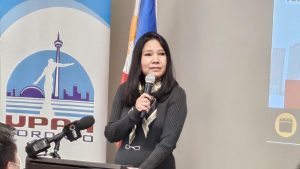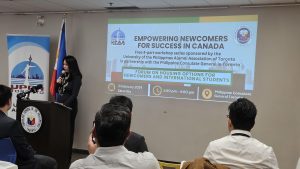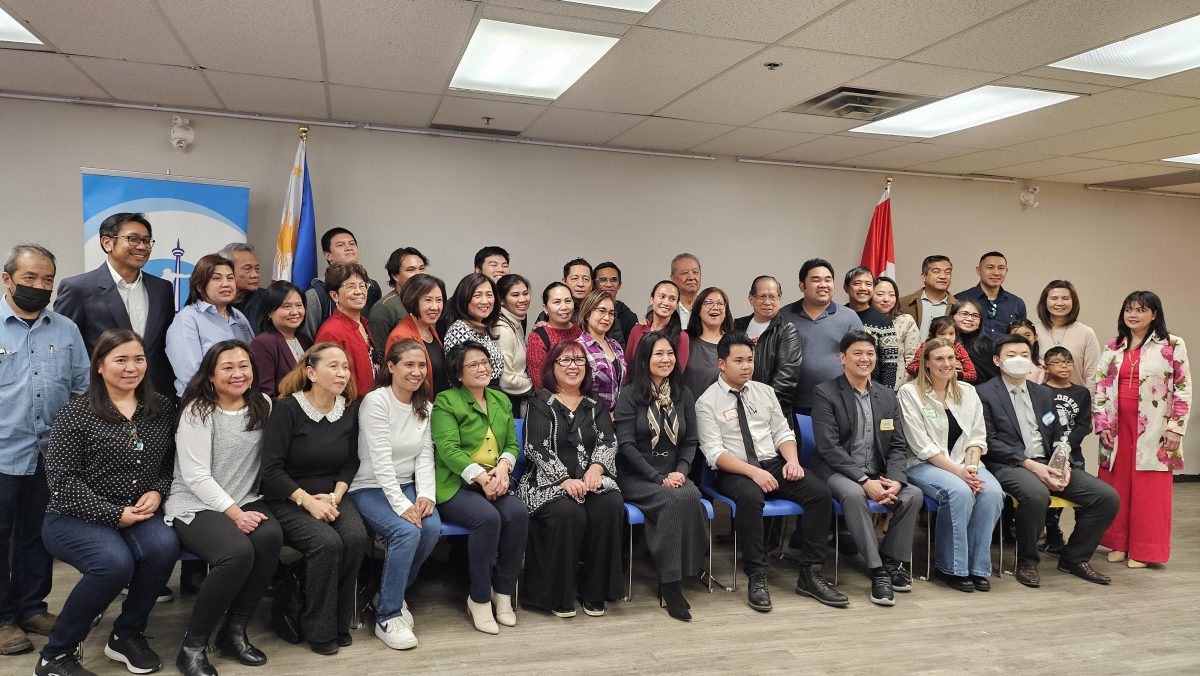Filipino int’l students in Toronto: Who do we go to for support and assistance?
Filipino int’l students in Toronto: Who do we go to for support and assistance?

Consul General Angelica Escalona speaks at the forum on housing options for newcomers and international students co-organized by the Philippine Consulate General in Toronto and the University of the Philippines Alumni Association Toronto.
Photo: Veronica C. Silva
Unique pathway to migrate poses a challenge for governance and assistance
By Veronica C. Silva
LJI Reporter
The Philippine Reporter
Some Filipino international students in Toronto and their advocates in the Filipino community are reaching out to the Philippine government for assistance as they navigate their new life in Canada.
Specifically, they are asking the Philippine Consulate in Toronto where they can go for help as they struggle with high costs of housing (rental) and food.
But they are disappointed to find out that there is no Philippine agency that has oversight in helping them.

The Philippine Consulate General in Toronto and the University of the Philippines Alumni Association Toronto host a forum on housing options for newcomers and international students.
Photos by Veronica C. Silva
International student and Migrante Ontario member Javier Jardeleza and Migrante Ontario chair Leny Simbre told The Philippine Reporter that have had dialogues with PCG-TO to determine who Filipino international students can go to for assistance.
Jardeleza said among the help they need from the Philippine government in Toronto are information on how to access affordable housing and food banks given the high cost of living.
At a recent forum on the housing crisis faced by international students and newcomers to Canada, the Philippine Consulate General in Toronto (PCG-TO) said that while other Filipinos abroad have Philippines agencies to help them — the Department of Migrant Workers for overseas Filipinos workers and the Commission on Filipinos Overseas, which conducts the pre-departure orientation seminar (PDOS) for emigrants — there is no single Philippine government agency that is exactly the go-to for international students.
“At the moment, there is no Philippine government agency that has oversight over international students – international students, not just to Canada, but (also) to other parts of the world. … For students, at the moment, wala pa (none yet), but we are in the stage of discussing this because we do see the need to do something before they reach their country of destination,” said Toronto Consulate Consul General Angelica C. Escalona, in response to an open-forum question from Simbre.

Participants and speakers at a housing forum co-organized by the Philippine Consulate General in Toronto and the University of the Philippines Alumni Association Toronto pose for group picture. Photo : Veronica C. Silva
In Toronto, the Migrant Workers Office (MWO) is identified on the Consulate website as one of its partner agencies, aside from the Department of Trade and Industry Toronto and Department of Tourism New York. MWO Toronto can be reached in the same building as the PCG-TO at 160 Eglinton Ave. East, with phone number (416) 975-8252.
When asked, Escalano said there has been dialogues between the Philippine and Canadian governments on issues around international students, but she did not give details.
“An issue like this is complex,” Escalona added, “but we do realize the need to do something from the Philippine side.”
Escalona urged the audience to share their thoughts on the matter with the Consulate which will share with other Philippine agencies for policy discussions.
Consul Rodney Jonas Sumague also told the audience that aside from continuous dialogues with the Canadian government, the Consulate is also working closely with the non-profit sector, the Filipino community, and the Filipino international students themselves to gather feedback on their issues and concerns.
“What we expect, of course, is when students come here, they know what they are going into as international students,” Sumague added. “But it’s a bit different because it’s becoming a pathway for migration. It’s a unique pathway because you are here to study. When you go out the Philippines, when you go here, you know what you’re getting into, and the main reason for that is to study. … But then again, … one of the pillars of our foreign policy is assistance to our overseas Filipinos, and we are here for that. We have several programs and services for that, especially if you’re stressed.”
Those who have studied in Canada and have Canadian work experience may have a path to permanent residence. International students can apply for a work permit to gain Canadian experience. After graduating, they can apply for a post-graduate work permit (PGWP) to gain more experience.
Jardeleza told TPR in a separate interview that while international students have prepared financially, many are unaware of the stark realities of the high cost of living.
“Nakakalungkot yung reasoning na pumunta kayo dito on your own (It’s sad to hear that line of reasoning that ‘you came to Canada on your own’,” said Jardeleza. While it is true that that Filipinos come to Canada to study, Javier said many prefer to work in Canada and that study is a pathway to find work in Canada because there are hardly jobs back home.
Immigration, Refugees and Citizenship Canada (IRCC) requires international students to show proof of their financial capacity to support themselves during their stay in Canada. Most recently, with the housing crisis gripping Canada – which is partly blamed on temporary residents, including international students — IRCC upped the financial requirement to keep pace with the cost of living. Starting 2024, an international student applicant will have to show proof that they have $20,635 to support themselves, up from $10,000 previously. This amount is on top of tuition fees, which is triple the fees for domestic students (those with permanent resident status or Canadian citizens), and travel costs.
Aside from access to information on affordable housing and food banks, international students also need information on their rights as tenants.
Jules (last name withheld upon request), 25, is an international student who had to struggle from eviction last year. While tenants are usually required to pay first month and last month’s advance, Jules said her landlord still demanded last month’s rent from her when she gave notice that she’s leaving. Unaware of her rights, she paid for another last month’s rent, but that didn’t stop her landlord from kicking her out of her room. Like other tenants, Jules didn’t sign a contract with her landlord who demanded cash payments. She sought help from the Landlord and Tenant Board and free legal support who said they can’t help her.
Aside from legal assistance, she said she also needed mental health support for what she experienced.
To help international students help each other, Jardeleza said a Filipino International Students Network is in the works with launch set for next month. Jules said such a network could help international students like herself.
Escalona also said last year that the Consulate in Toronto is organizing a convention for international students this spring to look into their needs.
Comments (0)